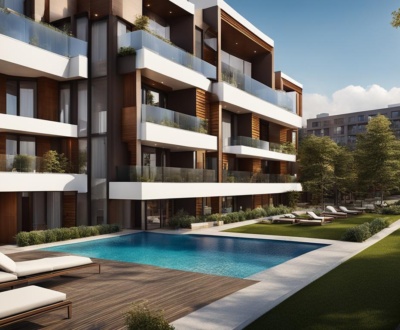Argentine Real Estate Market Trends & Forecasts
- January 22, 2024
- Argentina Investments, Argentina Property, Argentina Real Estate
As we step into the year 2024, the real estate landscape in Argentina continues to evolve, presenting both challenges and opportunities for investors, homeowners, and industry stakeholders. In this article, we will give you a clear picture of what’s happening in Argentina’s real estate scene for the year ahead. We will explore the current state of the economy in Argentina, government policies affecting the housing market, real estate market outlook and forecasts, as well as housing prices and trends in the country.
Key Takeaways:
- Stay informed about the Argentine real estate market trends and forecasts to make informed investment decisions.
- Consider the current state of the Argentine economy and its impact on the housing market.
- Explore real estate investment opportunities in Argentina, including incentives for foreign investors.
- Understand the outlook and forecasts for the Argentine real estate market and consider both urban and suburban areas.
- Evaluate current housing prices in Argentina and their relationship to economic factors and demand.
The Current State of the Argentine Economy
Argentina’s economy has long been subject to cycles of boom and bust, with significant implications for the real estate sector. The country has experienced periods of high inflation, economic recession, and political instability, all of which have influenced the housing market. These fluctuations have created challenges in terms of affordability and have led to shifts in demand within the rental markets.
Government policies, both historical and recent, have played a crucial role in shaping the housing market in Argentina. While they aim to promote stability and growth, frequent changes in regulations and economic policies have created uncertainty for property buyers and sellers. It is important to stay informed about the latest government policies and property buying and selling regulations when considering real estate transactions in Argentina.
Economic Cycles and Real Estate
Argentina’s economic cycles have a direct impact on the real estate sector. During periods of economic recession and political instability, the demand for properties tends to decrease, resulting in a more affordable market for buyers. However, these periods may also bring uncertainty, making buyers hesitant to invest in real estate.
Conversely, during economic booms, the demand for properties increases, driving up prices and potentially making the market less affordable for buyers. It’s important to navigate these economic cycles with caution and conduct thorough market research before making any real estate investment decisions.
The Role of Government Policies
Government policies play a vital role in shaping the Argentine housing market. They help regulate the real estate sector and promote stability and growth. However, frequent changes in regulations and economic policies can create uncertainty among property buyers and sellers.
One area that government policies impact is affordability. The government can implement measures to make housing more accessible to a greater number of people. For example, they may introduce subsidies, tax incentives, or social housing programs to promote affordable housing.
Table: Government Policies Affecting the Argentine Housing Market
| Policy | Impact |
|---|---|
| Subsidies for first-time homebuyers | Increases affordability and supports homeownership |
| Tax incentives for real estate investment | Encourages investment and stimulates the market |
| Regulations on property buying and selling | Ensures transparency and protects buyers and sellers |
Real Estate Investment Opportunities in Argentina
Argentina has long been recognized as a promising destination for real estate investment, particularly for foreign investors. The Argentine real estate market offers a range of opportunities, from residential properties in bustling cities to commercial developments in growing industries. With its diverse market and potential for high rental yields, investing in Argentine real estate can be a lucrative venture.
One of the key advantages for foreign investors is the unrestricted property ownership rights granted to non-residents. This allows international buyers to own a property in Argentina with the same rights as local residents, providing a sense of security and stability.
Investing in Argentine real estate also presents the potential for attractive rental yields, especially in major cities like Buenos Aires, Cordoba, and Rosario. These cities offer a vibrant urban lifestyle and high demand for rental properties, making them ideal locations for generating rental income.
However, it is important to acknowledge the potential challenges that come with investing in the Argentine real estate market. Economic volatility and fluctuating exchange rates can impact property values and returns on investment. Additionally, navigating the bureaucratic processes associated with property transactions can be complex and time-consuming.
Foreign investors are advised to seek local legal advice to ensure a smooth investment journey. Partnering with experienced professionals familiar with the Argentine real estate market can provide valuable insights and guidance, helping investors navigate the intricacies of property ownership, transaction processes, and legal requirements.
In summary, the Argentine real estate market offers enticing investment opportunities, particularly for foreign investors seeking favorable property ownership rights and high rental yields. However, it is crucial to approach investment decisions with diligence and gather the necessary local expertise to navigate economic volatility and bureaucratic processes effectively.
Outlook and Forecast for the Argentine Real Estate Market
As we look ahead to the future of the Argentine real estate market, it is crucial to consider various factors that shape its outlook. These include economic trends, regional growth, government policies, economic stabilization efforts, foreign investment, the business environment, and housing affordability. While specific predictions can be challenging, given Argentina’s cyclical nature of boom and bust, a cautious approach is advised.
Cities like Buenos Aires, Córdoba, and Rosario have traditionally experienced rapid growth due to their economic activities and industrial sectors. However, emerging trends in suburban and rural areas should not be overlooked, especially considering the increasing prevalence of remote work.
In 2024, government policies may focus on housing affordability, foreign investment regulations, and taxation related to real estate transactions. These policies will play a significant role in shaping the market dynamics and investment opportunities. It is important for buyers, sellers, and investors to stay informed and adapt to the evolving real estate landscape.
Economic Trends and Regional Growth
The performance of the Argentine real estate market is closely linked to economic trends and regional growth. The overall economic stability and growth of the country have a direct impact on the demand for properties. Regional disparities in economic activities and infrastructure developments can influence property values and investment potential.
For a comprehensive understanding, let’s take a closer look at some key economic trends and regional growth indicators:
| Indicator | Trend | Impact on Real Estate |
|---|---|---|
| Inflation Rates | Forecasted moderate inflation | Inflation can impact property values and rental rates. Buyers need to factor in inflation when considering long-term investments. |
| Government Policies | Focus on housing affordability and foreign investment regulations | Government policies can shape the real estate market by incentivizing affordable housing options and regulating foreign investments. |
| Regional Economic Activities | Diversified economic activities in major cities and emerging trends in suburban and rural areas | Regional economic activities drive demand for properties, with major cities traditionally experiencing fast growth. However, emerging trends in suburban and rural areas should also be considered. |
In summary, economic trends and regional growth indicators play a vital role in forecasting the Argentine real estate market. The interplay between these factors, along with government policies and economic stabilization efforts, will shape investment opportunities and the overall business environment for buyers, sellers, and investors.
Current Housing Prices in Argentina
The trend in real estate prices in Argentina over the past few years has been influenced significantly by the country’s economic context. Real estate prices have shown a mixed pattern, with some areas experiencing rising prices while others remain stable or even declining. This variability is largely influenced by regional economic activities, infrastructure developments, and overall demand for properties.
It’s important to consider the impact of inflation and currency fluctuations when comparing current real estate prices with those from a decade ago. Adjusted for inflation and currency devaluation, real property values may not have increased significantly or may have even decreased in some cases.
Regional Economic Activities and Property Prices
The regional economic activities play a vital role in determining property prices in Argentina. Cities or areas that experience robust economic growth, such as Buenos Aires, Córdoba, and Rosario, tend to have higher property prices due to increased demand from businesses and individuals seeking employment opportunities.
These cities are often hubs for various industries like finance, technology, and manufacturing, with a strong influence on property values. Infrastructure developments, such as the expansion of transportation networks and the establishment of commercial centers, can further drive up property prices in these regions.
Overall Demand for Properties
The overall demand for properties also contributes to the housing prices in Argentina. Factors like population growth, urbanization, and changes in lifestyle preferences can influence the demand for different types of properties, such as residential apartments, houses, or commercial spaces.
For example, the rise of remote work and the increased desire for larger living spaces due to the COVID-19 pandemic have led to a surge in demand for suburban and rural properties with spacious interiors and access to outdoor amenities.
Inflation and Currency Devaluation
Inflation and currency devaluation play a significant role in shaping real estate prices in Argentina. The country has faced periods of high inflation, which erode the purchasing power of individuals and businesses, impacting their ability to invest in properties.
Moreover, currency devaluation can affect property values, particularly in regions heavily reliant on exports or foreign investment. A weaker currency may make properties more affordable for foreign investors but can also lead to higher construction costs and limited access to imported materials, affecting the supply and pricing of properties.
It’s important for potential buyers and investors to consider these economic factors when evaluating the current housing prices in Argentina and making informed decisions.
| Factors Affecting Housing Prices in Argentina | Description |
|---|---|
| Regional Economic Activities | Economic growth in specific cities or regions can drive up property prices due to increased demand from businesses and individuals. |
| Infrastructure Developments | Expansion of transportation networks, commercial centers, and other infrastructure projects can influence property prices. |
| Overall Demand for Properties | Population growth, urbanization, and changes in lifestyle preferences impact the demand for different types of properties. |
| Inflation and Currency Devaluation | High inflation rates and currency devaluation can erode purchasing power and affect property values. |

Argentina’s Economic Forecast and Its Impact on Real Estate
When considering real estate investments in Argentina, it is crucial to examine the economic forecast and its potential impact on the market. In 2024 and beyond, Argentina’s economy is projected to experience moderate growth, with an average GDP growth rate of 1.5% over the next five years. This moderate growth indicates economic stability and suggests the potential for long-term growth in the real estate sector.
However, it is important to recognize that GDP growth is just one factor to consider when evaluating the impact on real estate. Argentina’s economy has a history of volatility, and potential economic fluctuations should also be taken into account. While the forecast indicates stability, it is essential to monitor and assess any potential changes in the economic landscape that may affect the real estate market.
To gain a comprehensive understanding of Argentina’s economic forecast and its implications for the real estate sector, it is advisable to analyze various factors such as government policies, global economic trends, and the business environment. This analysis will help investors make informed decisions and navigate potential economic fluctuations.
Key Points:
- Argentina’s economy is projected to experience moderate growth with an average GDP growth rate of 1.5% over the next five years.
- This moderate growth suggests economic stability and potential long-term growth in the real estate market.
- However, potential economic fluctuations should be considered as Argentina’s economy has a history of volatility.
- Monitoring government policies and global economic trends is essential for assessing the impact of the economic forecast on real estate investments.
With a comprehensive understanding of the economic forecast, investors can make informed decisions and maximize their opportunities in Argentina’s real estate market. By staying updated on economic trends and potential fluctuations, investors can navigate the market with confidence and capitalize on long-term growth prospects.
Considerations for Property Buyers in Argentina
Before buying property in Argentina, it’s important to consider the risks and challenges associated with the market. Economic instability, potential currency devaluation, and political uncertainty are key factors that need to be evaluated to make informed investment decisions.
Economic instability can have a significant impact on the property market, affecting demand and property values. Fluctuations in the economy can lead to reduced demand for real estate, which may result in falling property values. It’s crucial to stay updated on the economic indicators and trends to make strategic investment decisions.
Currency devaluation is another consideration for property buyers in Argentina. The value of the local currency can fluctuate, affecting the purchasing power and financial feasibility of property transactions. Potential currency devaluation can increase the costs of property purchases and impact the return on investment.
Political uncertainty is also a factor to be aware of when investing in Argentine real estate. Changes in government policies and regulations can impact the property market and create uncertainties for buyers. It’s important to closely monitor the political landscape and potential policy changes that may affect property transactions.
Property transactions in Argentina can be complex and involve bureaucratic processes. It’s essential to have a good understanding of the legal and regulatory framework surrounding property ownership and transactions. Seeking professional advice from local experts can help navigate through the challenges and ensure a smooth property acquisition process.
Investing in real estate always comes with risks and challenges. However, by thoroughly researching the market, understanding the risks involved, and seeking professional guidance, property buyers in Argentina can make informed decisions and mitigate potential challenges.

Key Considerations for Property Buyers in Argentina:
- Economic instability
- Currency devaluation
- Political uncertainty
- Complex property transactions
- Thorough research and professional guidance
Inflation and Currency Devaluation Effects on Real Estate
Inflation and currency devaluation in Argentina can have significant impacts on the real estate market. Let’s explore how these factors can affect property values, rental rates, and overall real estate investment opportunities.
Property Values and Capital Appreciation
Inflation can lead to an increase in property values over time, resulting in capital appreciation. As the cost of living rises, the demand for housing may also increase, driving up housing prices. This can be advantageous for real estate investors who own properties as their value appreciates, enabling potential profit upon resale.
However, it’s vital to consider the potential risks and challenges associated with high inflation rates. Inflation-driven property value increases may not always align with the overall economic stability and purchasing power of buyers in the market.
Rental Rates and Cash Flow
One potential positive effect of inflation is the potential for higher rental rates. As the cost of living increases, landlords and property owners may adjust their rental prices to compensate for rising expenses. This can lead to increased cash flow from rental properties, providing a favorable outcome for real estate investors.
However, it’s crucial to monitor the market and consider other factors such as demand and competition when determining rental rates. It’s also essential to investigate the economic stability and potential fluctuations that could impact the rental market in the long term.
Hedge Against Inflation
Real estate has often been considered a reliable hedge against inflation. As inflation erodes the value of currency, investments in tangible assets like real estate can help preserve the value of invested capital. Property values and rental rates generally tend to increase alongside inflation, providing a safeguard against financial loss during times of economic uncertainty.
However, it’s important to note that a high inflation environment can also present challenges, such as reduced purchasing power and economic instability. Investors should consider the overall economic conditions and seek professional advice to navigate potential risks associated with inflation.
Conclusion
In conclusion, the Argentine real estate market in 2024 presents a mixed landscape of opportunities and challenges for investors. With improved stability and consistent economic growth, Argentina offers a favorable environment for property investment. The availability of building permits and the increasing supply of real estate indicate the potential for market growth. However, it is important for investors to carefully evaluate the market and consider the risks and challenges associated with high inflation forecasts and currency devaluation.
To make informed investment decisions, investors should take into account government policies and economic trends. Seeking professional advice is crucial in navigating the complexities of the Argentine real estate market. Despite some uncertainties, the market still holds profitable opportunities for those who approach it with caution and knowledge.
Considering the current real estate market summary, investment opportunities abound in Argentina due to its economic stability and potential for long-term growth. Property prices fluctuate based on various regional and economic factors. However, by understanding the risks and challenges and seeking the right advice, investors can position themselves for success in the Argentine real estate market.
FAQ
What factors have historically influenced Argentina’s real estate market?
Argentina’s real estate market has been influenced by cycles of boom and bust, driven by factors such as high inflation, economic recession, and political instability.
How have government policies affected the housing market in Argentina?
Government policies, both historical and recent, have played a crucial role in shaping the housing market in Argentina. However, frequent changes in regulations and economic policies have sometimes created uncertainty for buyers and sellers.
What incentives does Argentina offer for real estate investment?
Argentina offers unrestricted property ownership for non-residents and the potential for high rental yields in major cities, making it an attractive option for real estate investment.
What should investors be cautious of when considering real estate investment in Argentina?
Investors should be aware of economic volatility, fluctuating exchange rates, and complex bureaucratic processes for property transactions. Seeking local legal advice is essential to navigate the complexities of the Argentine real estate market.
What factors should be considered when forecasting the Argentine real estate market?
Factors to consider when forecasting the Argentine real estate market include inflation rates, government policies, and global economic trends. The cyclical nature of the Argentine economy should also be taken into account.
How have real estate prices in Argentina changed over the past few years?
Real estate prices in Argentina have shown a mixed pattern, with some areas experiencing rising prices while others have remained stable or even declined. Regional economic activities, infrastructure developments, and overall demand for properties influence these price variations.
What is the projected economic growth for Argentina in 2024?
Argentina is projected to experience moderate economic growth in 2024, with an average GDP growth rate of 1.5% over the next five years. This stability indicates potential for long-term growth in the real estate market.
What risks should property buyers consider in Argentina?
Property buyers should evaluate the risks associated with economic instability, potential currency devaluation, and political uncertainty. These factors can impact demand for real estate, property values, and transaction execution.
How can inflation and currency devaluation in Argentina affect real estate?
Inflation and currency devaluation in Argentina can lead to capital appreciation, higher rental rates, and real estate acting as a hedge against inflation. However, potential risks related to reduced purchasing power and economic instability should also be considered.
More from our blog
See all postsRecent Posts
- Argentina Property Management: Expert Care & Services February 2, 2024
- Understanding Argentina Real Estate Law Essentials February 2, 2024
- Argentina Luxury Apartments: Upscale Living February 1, 2024










